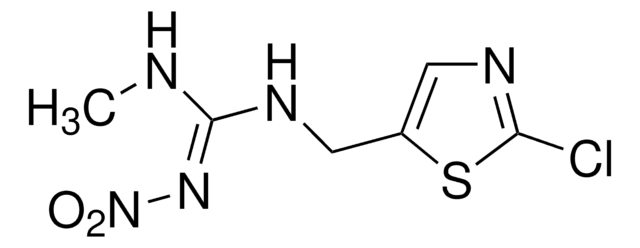32462
Fluopyram
PESTANAL®, analytical standard
Synonym(e):
N-[2-[3-Chlor-5-(trifluormethyl)-2-pyridinyl]-ethyl]-2-(trifluormethyl)-benzamid, N-{2-[3-Chlor-5-(trifluormethyl)-2-pyridyl]-ethyl}-α,α,α-trifluor-o-toluamid
About This Item
Empfohlene Produkte
Qualität
analytical standard
Qualitätsniveau
Produktlinie
PESTANAL®
Haltbarkeit
limited shelf life, expiry date on the label
Methode(n)
HPLC: suitable
gas chromatography (GC): suitable
Anwendung(en)
agriculture
environmental
Format
neat
SMILES String
FC(F)(F)c1cnc(CCNC(=O)c2ccccc2C(F)(F)F)c(Cl)c1
InChI
1S/C16H11ClF6N2O/c17-12-7-9(15(18,19)20)8-25-13(12)5-6-24-14(26)10-3-1-2-4-11(10)16(21,22)23/h1-4,7-8H,5-6H2,(H,24,26)
InChIKey
KVDJTXBXMWJJEF-UHFFFAOYSA-N
Suchen Sie nach ähnlichen Produkten? Aufrufen Leitfaden zum Produktvergleich
Allgemeine Beschreibung
Anwendung
Biochem./physiol. Wirkung
Rechtliche Hinweise
H-Sätze
P-Sätze
Gefahreneinstufungen
Aquatic Chronic 2
Lagerklassenschlüssel
11 - Combustible Solids
WGK
WGK 2
Flammpunkt (°F)
Not applicable
Flammpunkt (°C)
Not applicable
Choose from one of the most recent versions:
Besitzen Sie dieses Produkt bereits?
In der Dokumentenbibliothek finden Sie die Dokumentation zu den Produkten, die Sie kürzlich erworben haben.
Kunden haben sich ebenfalls angesehen
Unser Team von Wissenschaftlern verfügt über Erfahrung in allen Forschungsbereichen einschließlich Life Science, Materialwissenschaften, chemischer Synthese, Chromatographie, Analytik und vielen mehr..
Setzen Sie sich mit dem technischen Dienst in Verbindung.















